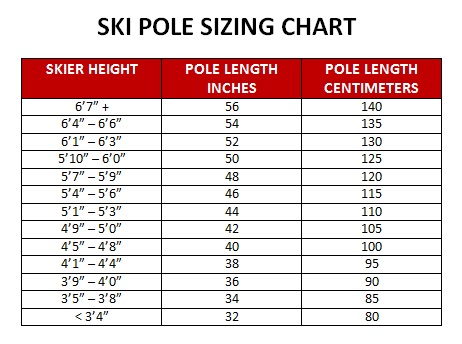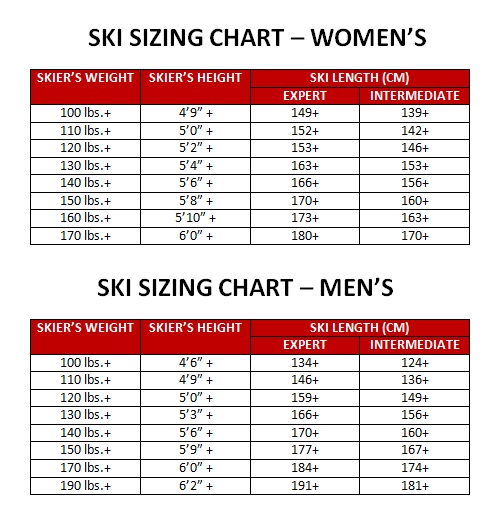Decoding the Ski Length Enigma: Your Guide to Perfect Ski Size
Choosing the right skis can feel like navigating a black diamond run blindfolded. But fear not, aspiring skiers and seasoned shredders. Unlocking the secrets of the perfect ski length lies in understanding the ski size chart – your compass to on-slope nirvana.
Ski length isn't a one-size-fits-all affair. It’s a carefully calculated equation involving factors like your height, weight, skill level, and preferred skiing style. A ski size chart acts as a decoder ring, translating these variables into a recommended ski length range, helping you maximize performance and enjoyment on the mountain.
Historically, ski length recommendations were primarily based on height. However, as ski technology and skiing styles evolved, so did the approach to sizing. Modern ski size charts incorporate a more nuanced understanding of factors beyond height, recognizing the influence of weight, ability, and even the type of terrain you prefer to conquer.
The importance of a proper ski size can’t be overstated. Skis that are too long can feel cumbersome and difficult to control, while skis that are too short can lack stability at higher speeds and in challenging snow conditions. A properly sized ski, guided by a ski sizing chart, enhances maneuverability, control, and overall skiing experience.
One of the main issues surrounding ski size charts is the variation between manufacturers. While general principles apply, each brand may have its own nuances in their sizing recommendations based on ski design and intended use. This can sometimes lead to confusion, highlighting the need to consult multiple resources and potentially seek expert advice.
A ski size chart typically presents a range of recommended ski lengths based on the factors mentioned earlier. For example, an intermediate skier who is 5'10" and weighs 170 lbs might find a recommended ski length range between 170cm and 180cm. Some charts even offer tailored recommendations for specific ski types, such as powder skis or carving skis.
One benefit of using a ski size chart is increased confidence on the slopes. Knowing you're on appropriately sized skis empowers you to push your limits and explore new terrain with greater control and stability. Another benefit is improved performance. The right ski length allows for efficient energy transfer, leading to smoother turns and more dynamic skiing. Finally, the correct ski size promotes safety by reducing the risk of falls and injuries associated with poorly matched equipment.
To find your ideal ski length, start by consulting a general ski size chart based on your height, weight, and skill level. Then, refine your selection by considering your preferred skiing style and terrain. For example, if you primarily ski powder, you might opt for a longer ski within the recommended range. Finally, consult brand-specific size charts for the skis you’re considering.
Advantages and Disadvantages of Relying Solely on Ski Size Charts
| Advantages | Disadvantages |
|---|---|
| Provides a starting point for choosing ski length | Doesn't account for personal preferences and nuances in skiing style |
| Easy to use and accessible | Can be overwhelming with varying recommendations between brands |
| Considers key factors like height, weight, and skill level | May not be accurate for highly specialized skis or extreme skiing styles |
Five Best Practices: 1. Consider your skill level honestly. 2. Factor in your preferred terrain. 3. Consult brand-specific charts. 4. Rent skis to experiment. 5. Seek expert advice from a ski shop.
Five Real Examples: An advanced skier choosing longer powder skis, a beginner opting for shorter skis for easier control, a park skier selecting twin-tipped skis, a racer using specialized slalom skis, and an all-mountain skier choosing a mid-length ski.
Five Challenges and Solutions: 1. Inconsistent charts - consult multiple sources. 2. Uncertainty about skill level - err on the shorter side. 3. Budget constraints - rent or buy used. 4. Limited access to demos - research reviews. 5. Changing snow conditions – consider a quiver of skis.
FAQ: 1. What if I’m between sizes? – Consider your skiing style. 2. Are there different charts for men and women? – Some brands offer gender-specific charts. 3. Do ski size charts account for boot sole length? – Not typically. 4. Can I use a ski size chart for children? – Yes, specific children's charts are available. 5. Should I size up or down for powder skis? – Generally, size up. 6. What about skis for park and pipe? - Often shorter and twin-tipped. 7. Do I need to adjust my ski length based on my bindings? - No, bindings are adjusted independently. 8. How often should I replace my skis? – When they show signs of wear or damage, or no longer meet your needs.
Tips and Tricks: Consider demoing skis before buying. Don’t be afraid to ask for expert advice. Your boot fit also influences your ski performance.
Ultimately, finding the right ski length is a journey, not a destination. Ski size charts provide a crucial roadmap, offering valuable guidance and helping you navigate the complexities of ski selection. By understanding the principles of ski sizing, considering your individual needs, and embracing the process of experimentation, you’ll unlock the key to a more confident, controlled, and ultimately, more enjoyable skiing experience. Don't hesitate to utilize these resources, consult with professionals, and embrace the process of discovery to find the skis that truly elevate your performance and passion on the slopes. Remember, the perfect ski length isn't just about numbers on a chart, it's about finding the sweet spot where your skills and the mountain connect.
Unleash the fun creative clown makeup ideas for kids
Unforgettable khao lak escape your guide to sands hotel thailand
Where ink meets mastery tracking down ink master tattoo artists locations














